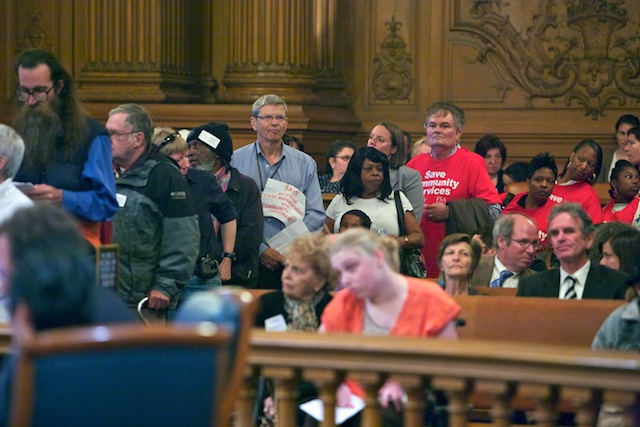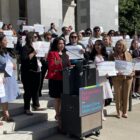In order to allow public discussion of proposed cuts to the Department of Public Health’s budget, Tuesday’s Board of Supervisors meeting went into overtime, making room for a Beilenson Hearing — which is required by the California Health and Safety Code for public input into proposed public health service reductions.
The public outcry is in response to Mayor Gavin Newsom’s announced 2010-11 budget for San Francisco, which includes a $6 million cut from the mental health and substance abuse programs. Tuesday’s meeting drew both recipients and administrators of San Francisco’s Public Health services.
Jennifer Friedenbach, executive director of the Coalition on Homelessness, said that those who rely on public health services would be left to scramble without medical attention. She said the public health cuts would affect thousands of people who “would end up being destabilized and potentially not only have their quality of life deteriorate, but also cost the city a lot of money.”
Friedenbach explained that as proposed, the budget cuts would reverse the single standard of care policy, leaving 1,600 people without mental health treatment. Additionally, she said the cuts would reduce the capacity of the city’s publicly-funded outpatient facilities by 40 percent.
The California Health and Safety Code mandates that before the public health budget changes, the Board of Supervisors must open up the floor to anyone wishing to testify on the subject. With an audience that spilled over into a full overflow room at City Hall, citizens testified throughout the evening – and early morning – on the lack of room in the public health arena for cuts. Mental health services accounted for a large portion of the dialogue.
Cathy Spensley, director of the Family Service Agency’s senior division, testified about the intersection of mental health services and the welfare of the city’s elderly.
“We serve clients too frail and too disabled to be served in the adult clinics … the people we serve are among the poorest and most disabled,” Spensley said, adding that without mental health funding, many of her clients could end up calling 911, going to jail or becoming homeless.
The hearing also saw citizens advocating for the continuation of the Mobility Assistance Patrol program, the S.R.O. Collaborative, HIV/AIDS care and women’s and transgender health, among other publicly-funded health interests.
Friedenbach said that she and the Coalition for Homelessness have been working to find alternative cuts. So far, they have come up with options such as cutting duplicative upper management positions in the mayor’s office, which — as opposed to downsizing public health — Friedenbach said, would have “no impact on vulnerable populations.”
Over the next two weeks, the city government will continue to hammer out the final version of the city budget before the next fiscal year begins on July 1.










